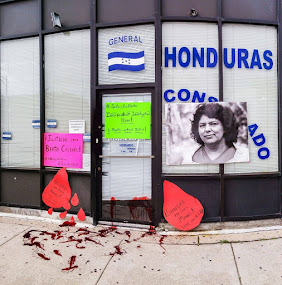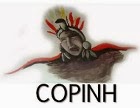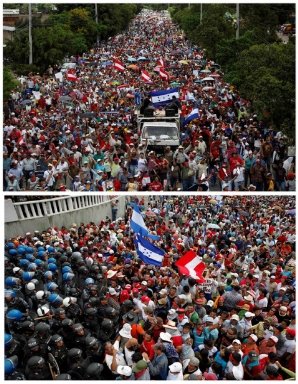 Report from La Voz de los de Abajo delegation visit with Fraternal Black Organization of Honduras (OFRANEH)
Report from La Voz de los de Abajo delegation visit with Fraternal Black Organization of Honduras (OFRANEH)
The Garífuna have been in resistance since the founding of their community when they resisted the slave trade as maroons and then resisted domination by multiple colonial empires. Since founding their community in Honduras, the Garífuna have been perpetually facing a struggle to survive. It is no wonder, then that they have played a major part in the resistance against the coup d'etat, sharing lessons gained over centuries of resistance with the rest of the movement. The strongest and most grassroots organization amongst the Honduran Garífuna, the National Fraternal Organization of Black Hondurans (OFRANEH), has been present in the resistance since the first day.  When the delegation arrived at the OFRANEH office in La Ceiba the office was full of young people attending an OFRANEH workshop on community radio, the workshops included technical practice and training and workshops on thinking about oppression based on race, class and gender. It was a lively and enthusiastic atmosphere in which some of the young radio producers interviewed members of the delegation.
When the delegation arrived at the OFRANEH office in La Ceiba the office was full of young people attending an OFRANEH workshop on community radio, the workshops included technical practice and training and workshops on thinking about oppression based on race, class and gender. It was a lively and enthusiastic atmosphere in which some of the young radio producers interviewed members of the delegation.
The delegation then met with Miriam Miranda, the General Coordinator of OFRANEH and with Alfredo Lopez, the Vice President. 
Miriam and Alfredo explained that the Garifuna community has been very affected by the coup because the coup-makers have economic interests in the areas where the Garifuna live. Like many other Hondurans fighting for the right to land, they are in a conflict with Honduran oligarch Miguel Facussé in Vallecito. “He feels that he is the owner of all Honduras and he is a part of the groups that really has control in this country,” explains Miriam.
The groups in power have been strengthened by the coup and have more repressive forces. Military and security people are now in very important positions at the national level  much more than before. This is one way that they are strengthening their power.
much more than before. This is one way that they are strengthening their power.
Miriam talked about how the Garífuna suffer because they live in a strategic zone on the beach. “Previously it was decided that tourism would be key for the country’s economy - a mistaken idea because we do not have the necessary conditions for developing that kind of tourism. The Garifuna live on the beach and our communities are in permanent resistance because government policies protect foreign and international corporate investments. Living in that area is a privilege but also a challenge,” she explained
There is a mega tourism project being developed in Tela that will include a golf course, although not even Costa Rica has been able to make that kind of tourism work. The infrastructure for the project is almost done. The Garifuna community of Barra Vieja with its 117 families is the thorn in the foot of the project. The governmental tourism agency (IHT) can’t negotiate a solution and it seems that there will be a violent eviction of the community. In this case when Zelaya was president he could not oppose the developers. We sent him many letters advising him of the problem throughout the 2 years of attempted negociations. This project would cause the complete disappearance of Barro Viejo.
Other problems faced are the presence of narcotics traffic in the region and climate change that is bringing more storms and damage that also force people to leave their communities.
“Because of the problem of impunity we have gone to the human rights organizations to make our problems visible and to bring international organizations to come to our zone of the country to observe the situation,” she explained. "We are under surveillance because of our participation in the resistance and because our positions challenge the interests of the elite powers in the country.”
For more than 2 months after the coup OFRANEH  mobilized to Tegucigalpa to participate in the resistance. “This wasn’t about defending Mel Zelaya - he was a person who in the moment played an important role because he consulted with organizations like OFRANEH about the realities that affect us. The organization went to Tegucigalpa for the restitution of Zelaya, out of respect for constitutionality, and for a participative democracy not just representative,” explains Miriam. Miriam noted that some people call OFRANEH Zelayista but the Garifuna really benefited the least from Zelaya. Zelaya's enemies are even more our enemies because we were in resistance before and permanently. It was OFRANEH together with the indigenous organization COPINH who presented the proposal for reform of the constitution. The national constitutional assembly is important so the people can say what are their priorities. The Garifuna people remain committed to the struggle for a popular constitutional assembly.
mobilized to Tegucigalpa to participate in the resistance. “This wasn’t about defending Mel Zelaya - he was a person who in the moment played an important role because he consulted with organizations like OFRANEH about the realities that affect us. The organization went to Tegucigalpa for the restitution of Zelaya, out of respect for constitutionality, and for a participative democracy not just representative,” explains Miriam. Miriam noted that some people call OFRANEH Zelayista but the Garifuna really benefited the least from Zelaya. Zelaya's enemies are even more our enemies because we were in resistance before and permanently. It was OFRANEH together with the indigenous organization COPINH who presented the proposal for reform of the constitution. The national constitutional assembly is important so the people can say what are their priorities. The Garifuna people remain committed to the struggle for a popular constitutional assembly.
This challenge of the coup for OFRANEH is a project that includes everyone and all strategies for struggle. “We are especially focusing on two key sectors: women and youth. Women pass our culture and identity to the youth. If women are not educated and prepared they can’t do that. Women are also the ones resisting in the community and the role of youth is basic.”
OFRANEH also has communication media  projects and works with the National Front of Popular Resistance on communication projects because the coup demonstrated the fundamental role of the press, which Miraim explains, “is called the fourth pillar of power but really it is the first because it actually creates opinion.” OFRANEH sees the importance of the communication media and radio not only for culture but also for analysis, struggle and answers to the questions of struggle.
projects and works with the National Front of Popular Resistance on communication projects because the coup demonstrated the fundamental role of the press, which Miraim explains, “is called the fourth pillar of power but really it is the first because it actually creates opinion.” OFRANEH sees the importance of the communication media and radio not only for culture but also for analysis, struggle and answers to the questions of struggle.
They are working with the Frente in the communication project to  create media. Alberto noted that in Tegucigalpa some people have the idea to compete directly with the big coup media which consumes a lot of resources but that OFRANEH believes that the movement has to create its own media. The Frente is moving forward with popular communication projects such as popular radios, for example in Santa Barabara the Federation of Patronatos of the West has a project. Radio Progreso is participating also. Part of the constitutional reform proposal has been the creation of a legal framework to protect the rights to frequencies for community radio and television.
create media. Alberto noted that in Tegucigalpa some people have the idea to compete directly with the big coup media which consumes a lot of resources but that OFRANEH believes that the movement has to create its own media. The Frente is moving forward with popular communication projects such as popular radios, for example in Santa Barabara the Federation of Patronatos of the West has a project. Radio Progreso is participating also. Part of the constitutional reform proposal has been the creation of a legal framework to protect the rights to frequencies for community radio and television.
Over time OFRANEH's strategy within the resistance has changed. OFRANEH went to Tegucigalpa to join the people’s resistance and events happened as they happened. As a social movement OFRANEH and others have to define a strategy to live under a regime that is much more dangerous that previously. OFRANEH believes that it is important and fundamental in this moment for debate of all the people to open up about what it means to live in a democracy; to create a permanent process of education, preparation and organization; to strengthen the process of alliances with other forces not only of the Garifuna and indigenous peoples but with other social sections. “This a way to strengthen the struggle so that no one is alone and the problem of one sector is all a problem for all of us.” An example of the possibilities is the campesinos in MUCA and Zacate Grande where Miguel Facusse is defying the agreements reached. He says that the government signed the agreements not him so he won’t respect them. Facussé is the point in common for Colon, Zacate Grande, el Vallecito, etc.
As Miriam pointed out, “There is no recipe for the struggle but we need to continue to develop a strategy for the fight for life.”
 The following article is translated by La Voz and reproduced from El Libertador. For background information on the struggle for land in Aguán see report of recent La Voz de los de Abajo delegation to the region.
The following article is translated by La Voz and reproduced from El Libertador. For background information on the struggle for land in Aguán see report of recent La Voz de los de Abajo delegation to the region.








































